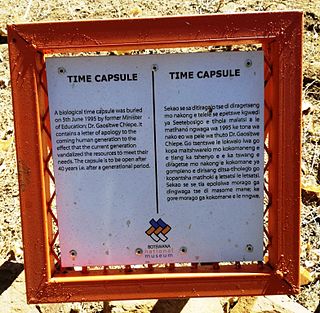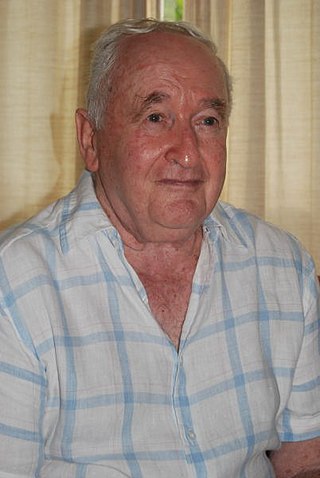
The San peoples, or Bushmen, are the members of the indigenous hunter-gatherer cultures of southern Africa, and the oldest surviving cultures of the region. Their recent ancestral territories span Botswana, Namibia, Angola, Zambia, Zimbabwe, Lesotho and South Africa. They speak, or their ancestors spoke, languages of the Khoe, Tuu and Kxʼa language families, and are seen by outsiders as a people only in contrast to neighboring pastoralists such as the Khoekhoe and descendants of more recent waves of immigration such as the Bantu, Europeans and Asians.
Political anthropology is the comparative study of politics in a broad range of historical, social, and cultural settings.
Herman Max Gluckman was a South African and British social anthropologist. He is best known as the founder of the Manchester School of anthropology.
The Kingdom of Mapungubwe was a medieval state in South Africa located at the confluence of the Shashe and Limpopo rivers, south of Great Zimbabwe. The name is derived from either TjiKalanga and Tshivenda. The name might mean "Hill of Jackals" or "stone monuments". The kingdom was the first stage in a development that would culminate in the creation of the Kingdom of Zimbabwe in the 13th century, and with gold trading links to Rhapta and Kilwa Kisiwani on the African east coast. The Kingdom of Mapungubwe lasted about 80 years, and at its height the capital's population was about 5000 people.
The University of Botswana Staff Union, formerly the University of Botswana Non-Academic Staff Union (UBNASU) is a trade union affiliate of the Botswana Federation of Trade Unions (BFTU).

Phandu Tombola Chaka Skelemani is a Motswana who is the current speaker of the National Assembly of Botswana. He served in the government of Botswana as Minister of Foreign Affairs from 2008 to 2014. A member of the ruling Botswana Democratic Party (BDP), Skelemani is a Member of Parliament in the National Assembly of Botswana and a member of the Pan-African Parliament from Botswana, and he served as Attorney-General of Botswana from 1992 to 2003.
The Department of Social Anthropology at the University of Manchester, founded by Max Gluckman in 1947 became known among anthropologists and other social scientists as the Manchester School. Notable features of the Manchester School included an emphasis on "case studies", deriving from Gluckman's early training in law and similar to methods used in law schools. The case method involved detailed analysis of particular instances of social interaction to infer rules and assumptions. The Manchester School also read the works of Marx and other economists and sociologists and looked at issues of social justice such as apartheid and class conflict. Recurring themes included issues of conflict and reconciliation in small-scale societies and organizations, and the tension between individual agency and social structure.
Frederick George Bailey, who published professionally as F. G. Bailey, was a British social anthropologist who spent the second half of his career in the United States at the University of California, San Diego (UCSD). He received his Ph.D. in social anthropology from Manchester University, working under Max Gluckman, and is closely associated with the Manchester School of social anthropology. A prolific writer of some sixteen books in anthropology, he is probably best known for his studies of local and organizational politics. He conducted fieldwork in Bisipāra, Orissa, India, and has also written on political functions, particularly the ways that social structure arises out of and is used by the interactions of individuals.

The official language of Botswana is English, while Setswana is considered to be a national language. English, which was inherited from colonial rule, is the language of official business and most written communication. Most of the population speak Setswana, but over 20 smaller languages are also spoken. Some of the country's languages are in danger of becoming extinct.
John L. Comaroff is Professor of African and African American Studies and of Anthropology, Oppenheimer Fellow in African Studies at Harvard University. He is recognised for his study of African and African-American society. Comaroff and his wife, anthropologist Jean Comaroff, have collaborated on publications examining post-colonialism and the Tswana people of South Africa. He has written several texts describing his research and has presented peer-reviewed anthropological theories of African cultures that have relevance to understanding global society.
Peter Maurice Worsley was a noted British sociologist and social anthropologist. He was a major figure in both anthropology and sociology, and is noted for introducing the term Third World into English. He not only made theoretical and ethnographic contributions, but also was regarded as a key founding member of the New Left.
The Rhodes-Livingstone Institute (RLI) was the first local anthropological research facility in Africa; it was founded in 1937 under the initial directorship of Godfrey Wilson. It is located a few miles outside Lusaka. Designed to allow for easier study of the local cultures of Northern Rhodesia, now Zambia, it became the base of operations for a number of leading anthropologists of the time.
John Arundel Barnes FBA was an Australian and British social anthropologist. Until his death in 2010, Barnes held the post of Emeritus Professor of Sociology, Fellow of Churchill College. From 1969 to 1982, he held the post of Professor of Sociology at the University of Cambridge. Previous positions include faculty posts in social anthropology at the University of Sydney and the Australian National University in Canberra, He also was associated with Academy of the Social Sciences in Australia, University College London, St John's College, Cambridge, Balliol College, Oxford and the Rhodes-Livingstone Institute. Barnes was a student of Max Gluckman in the Manchester School.
The Eloyi Christian Church was founded by Archbishop Jakoba Keiphile -a-Seduma in 1955 in the small village of Tsetsebjwe, to the southeast of Selebi Phikwe in Botswana. The Church has since spread across Botswana and into neighboring countries like South Africa and Zimbabwe. It has attracted much attention for its dramatic scenes and exorcisms of demons.
Tsetsebjwe is a village in the Bobirwa sub-district of the Central District of Botswana. It is in the Central Bobonong census district. As of 2001 it had a population of 4,396. The village is northwest of the privately owned Limpopo-Lipadi Game and Wilderness Reserve, near the South African border.
Moremi is a village in the Central District of Botswana, about 40 kilometres (25 mi) east of Palapye. The village lies in a bend of the Lotsane River, a seasonal tributary of the Limpopo River. It lies just north of the dramatic Tswapong Hills.

Mary Gluckman (1917–1990) was an Italian linguist and anthropologist. She was the wife of Professor Max Gluckman at Manchester University and worked at her husband's side for many years. After his death in 1975, she served with Voluntary Service Overseas for over two years in Sierra Leone.
Pnina Werbner was a British social anthropologist. Her work focused on Sufi mysticism, diasporas, Muslim women and public sector unions in Botswana. She has written extensively about the Arab Spring. Werbner was married to anthropologist Richard Werbner, and was the niece of Max Gluckman.

Emanuel Marx was a German-born Israeli social anthropologist, Professor Emeritus in the Department of Sociology and Anthropology at Tel Aviv University. He was a winner of the Israel Prize in 1998 for sociological research, and was an honorary member of the British Royal Anthropological Institute.

Peter Lein Geschiere is a Dutch anthropologist, Africanist and Emeritus Professor of Anthropology at the University of Amsterdam. He studied at the Free University of Amsterdam obtaining a MA in history in 1967, a MA in anthropology in 1969, and a PhD in anthropology in 1978. Geschiere performed field work in Tunisia, Zaire, French- and English-speaking Cameroon and Senegal (1968-2001), and was a lecturer (1969-1978) and senior lecturer (1978-1988) at the Free University of Amsterdam. Then he held a professorship in Non-Western History at Erasmus University Rotterdam (1985-1988) and was a researcher at the African Studies Centre Leiden (1986-1988). At Leiden University Geschiere worked as Professor of Anthropology and Sociology of Sub-Saharan Africa (1988-2002). From 2000 onward he was Professor of Anthropology at the University of Amsterdam. Geschiere specialised on Cameroon and the comparative study of processes of change in Africa. In 2002 he won the Distinguished Africanist Award from the US-based African Studies Association.






